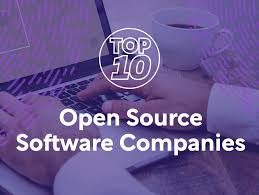In the contemporary business landscape open-source software has emerged as powerful tool for companies of all sizes. Offering flexibility. Cost-effectiveness. Community support. These open-source solutions are increasingly favored over proprietary alternatives. This discussion delves into the top 10 open-source software options making significant impacts in the business world. Highlighting their features. Benefits. Use cases.
Open-source software refers to programs whose source code is freely available for anyone to inspect modify and enhance. This model fosters a collaborative environment. Developers across the globe contribute to the improvement and security of the software. For businesses, this means access to cutting-edge technology without the hefty price tag often associated with proprietary software.
WordPress is leading open-source content management system (CMS). It powers over 40% of all websites on the internet. It offers extensive customization options through thousands of plugins and themes. This makes it ideal for businesses looking to create and manage a robust online presence. From simple blogs to complex e-commerce sites WordPress is versatile enough to handle a wide range of business needs.
Key Benefits:
- User-friendly interface
- Extensive library of plugins and themes
- Strong community support
LibreOffice: The Office Suite Alternative
LibreOffice is an open-source office suite that provides a powerful alternative to Microsoft Office. It includes applications for word processing, spreadsheets, presentations, and more. Businesses can benefit from its comprehensive features and compatibility with various file formats without incurring licensing costs.
Key Benefits:
- No licensing fees
- Compatibility with Microsoft Office formats
- Regular updates and improvements
GIMP: Graphic Design on a Budget
GIMP (GNU Image Manipulation Program) is a versatile open-source graphic design tool. It offers advanced photo editing capabilities, making it a popular choice for businesses that require high-quality graphic design without investing in expensive software like Adobe Photoshop. GIMP supports a wide range of file formats and offers extensive customization through plugins.
Key Benefits:
- Cost-effective solution for graphic design
- Extensive feature set
- Active community and plugin support
Apache OpenOffice: Comprehensive Office Productivity
Apache OpenOffice is another excellent open-source office suite that includes tools for word processing, spreadsheets, presentations, and more. It is user-friendly and provides a familiar interface for those transitioning from proprietary office software. OpenOffice is particularly useful for small to medium-sized businesses looking to reduce software costs.
Key Benefits:
- Comprehensive office suite
- Cost savings on software licenses
- Cross-platform compatibility
Odoo: Integrated Business Management
Odoo is a comprehensive open-source business management software that integrates various business applications such as CRM, ERP, accounting, project management, and more. It is highly modular, allowing businesses to select and customize the applications that best suit their needs. Odoo's flexibility and scalability make it suitable for businesses of all sizes.
Key Benefits:
- Integrated suite of business applications
- Customizable and scalable
- Active community and professional support options
Mozilla Thunderbird: Email and Communication
Mozilla Thunderbird is an open-source email client that offers robust features for managing business communications. It supports multiple email accounts, advanced filtering, and powerful search capabilities. Thunderbird's open-source nature allows for extensive customization and integration with other business tools.
Key Benefits:
- Free and open-source
- Supports multiple email protocols
- Customizable with add-ons
Nextcloud: Secure File Sharing and Collaboration
Nextcloud is an open-source platform for file sharing, collaboration, and communication. It provides businesses with a secure way to store, access, and share files from anywhere. Nextcloud includes features like document editing, calendar, and contacts integration, making it a comprehensive solution for team collaboration.
Key Benefits:
- Enhanced security and privacy controls
- Integrated collaboration tools
- Customizable and extensible
VLC Media Player: Versatile Media Playback
VLC Media Player is a free and open-source media player that supports a wide range of audio and video formats. It is an essential tool for businesses involved in media production, marketing, or any activities requiring reliable media playback. VLC's versatility and ease of use make it a favorite among users.
Key Benefits:
- Supports a wide range of media formats
- Free and open-source
- Customizable with plugins
Magento: E-commerce Excellence
Magento is a powerful open-source e-commerce platform that provides businesses with the tools to create and manage online stores. It offers extensive customization options, scalability, and a robust set of features for product management, payment processing, and marketing. Magento's flexibility makes it suitable for businesses ranging from small startups to large enterprises.
Key Benefits:
- Comprehensive e-commerce features
- Scalable and customizable
- Strong community support and professional services
MySQL: Database Management
MySQL is a widely used open-source relational database management system. It is known for its reliability, scalability, and performance. Businesses use MySQL to manage large volumes of data, support web applications, and ensure data integrity. Its open-source nature means businesses can customize it to meet their specific needs.
Key Benefits:
- High performance and reliability
- Scalable for large datasets
- Extensive community and commercial support
Conclusion: Embracing Open-Source Solutions
In conclusion, open-source software offers numerous benefits for businesses, including cost savings, flexibility, and community-driven innovation. The top 10 open-source tools discussed here—WordPress, LibreOffice, GIMP, Apache OpenOffice, Odoo, Mozilla Thunderbird, Nextcloud, VLC Media Player, Magento, and MySQL—demonstrate the diverse applications and advantages of integrating open-source solutions into business operations. By leveraging these tools, businesses can enhance productivity, improve efficiency, and stay competitive in a rapidly evolving digital landscape.
